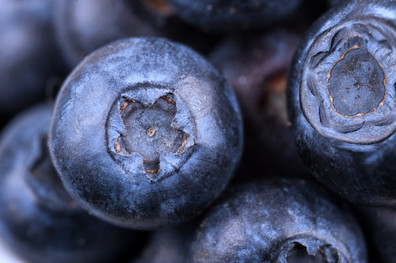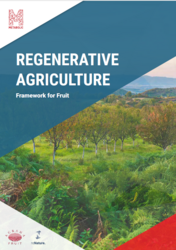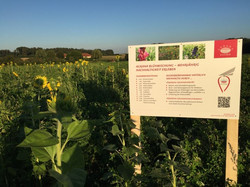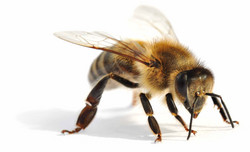Biodiversity
On the one hand, we pay attention to biodiversity in our supply chain, i.e. sustainable agriculture. On the other, we also strive to safeguard local ecosystems and maintain biodiversity at our production sites.
regenerative agriculture
In the 2020|21, AGRANA Fruit launched a project on regenerative agriculture focusing on the cultivation of fruits for which there is a lack of globally recognised specifications for regenerative production to date. Regenerative agriculture, among its other benefits, serves to fix carbon dioxide in the soil by building up humus, thus improving soil health and increasing biodiversity.
With the support of external experts, AGRANA has developed sets of guidelines for implementing regenerative agriculture for ground crops (such as strawberries), bush crops (for example, blueberries and raspberries) and tree crops (e.g., peaches).
These guides identified 14 practices that represent regenerative methods in fruit production. The resulting, largely positive effects on soil health, biodiversity and water use were elaborated and indicators developed to measure these effects. In addition, implementation plans and measurability schedules for the various measures in the three fruit categories were developed and aspects of geographic transferability to different regions or countries were addressed. These targets for regenerative practices were implemented at AGRANA's agricultural production site in Luka, Ukraine, in the 2021|22 financial year. The site, which produces fruit mainly for the local fresh market, was thus able last year to pass the external audit to Global GAP requirements, which are rated as Gold-equivalent in the FSA benchmarking system.
AGRANA Fruit is significantly advancing in its regenerative agriculture journey by working with blueberry and strawberry farmers to establish pilot farms in Canada and Mexico, respectively. More exciting news around this landscape is coming, and we are very open to more collaboration.
Fill out the following form to download the AGRANA Fruit Regenerative Agriculture Framework for Fruits.
FLOWering Fields
In 2021, about 3,600 hectares were greened in Austria with catch-crop mixes from Österreichische Rübensamenzucht GmbH, a not-for-profit subsidiary of AGRANA Zucker GmbH that provides farmers with GMO-free seed, largely from its own in-house propagation.
The catch-crops loosen the soil structure, mobilise nutrients, activate soil fauna and improve field biodiversity. In addition, flowered areas of annuals and perennials were established; together, the flowering fields provide ideal forage for wild animals, offer honey plants for bees, and add to the beauty of the landscape.
Bee Initiative
The harvests of many crops, particularly those of fruit-bearing plants and trees, are heavily dependent on pollination by bees. In addition to the wind, water, birds, bumblebees and wild bees, the honey bee plays a particularly important role in pollination.
As a processor of agricultural produce in its Fruit, Starch and Sugar segments, the long-term quantitative and qualitative availability of agricultural commodities forms a fundamental precondition for AGRANA’s business operations. Furthermore, AGRANA offers a wide range of bee feed products.
As a result, and as part of its sustainability initiatives, AGRANA started a project in 2016 to protect honey bees. Currently, there are ten bee hives installed at each of the Group’s Austrian sites. Each site is taken care of by a local beekeeper. The bee colonies are also used in workshops for schools to teach relationships in nature.



